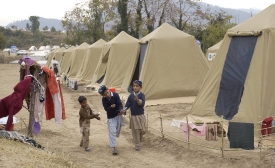national security
The election of Donald Trump as the next U.S. president is sure to send shockwaves throughout the global development community as worries rise about his aid policy and stated position on climate change. Little is known about exactly what a Trump presidency means for foreign aid, in part because in this election development issues have been largely overshadowed by debates over national security, immigration.
For the world, yesterday was the annual celebration of World Food Day, a moment to reflect on the critical work being done to provide nutritious food for those without it and to give thanks for the food that many people have access to. In the State Department, for a small office of 10, every day is World Food Day.
The Committee of the Whole that adopted 22 guidelines worth considering had its marathon meeting here under the Senate Chairman Mian Raza Rabbani has also suggested that Pakistan should re-establish a Public Diplomacy Office at the Foreign Office. This will function as the Foreign Office’s public diplomacy and soft power office and an inter-ministerial space for projecting cultural, economic and trade outputs.
While cyber and Internet issues were once seen as technical issues solely reserved for computer geeks, today they are increasingly being seen around the world as inextricably linked to national security, economic growth, social development, and human rights. Therefore, these issues are increasingly a core aspect of our foreign policy.

Marking half a century of strong diplomatic relations, the United States and Singapore on Wednesday (Aug 3) laid out an ambitious vision for future bilateral cooperation in a wide spectrum of areas across defence, cybersecurity, innovation, trade and people-to-people exchanges. [...] The joint statement is the most substantive outcome of Mr Lee’s official visit this week to the US to commemorate the 50th anniversary of diplomatic ties.
In the midst of all this turmoil, Arab diplomacy has been strangely absent. Some Arab countries have been providing military support for different protagonists in different conflicts, notably in Libya, Yemen, and in the war against terrorism in Syria and Iraq. Where, however, is Arab diplomacy? What diplomatic efforts are being made in every one of these cases are being led by non-Arabs or non-Arab organizations.

A new course on non-military tools utilized in diplomacy at the National War College, a training course on PD for Ukrainian government officials, and research on contemporary challenges to PD.







